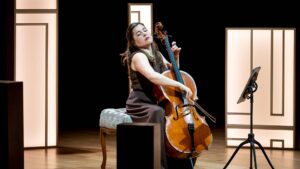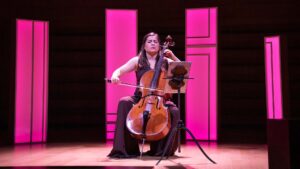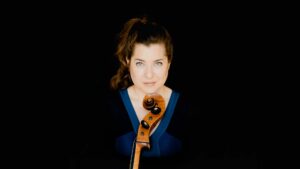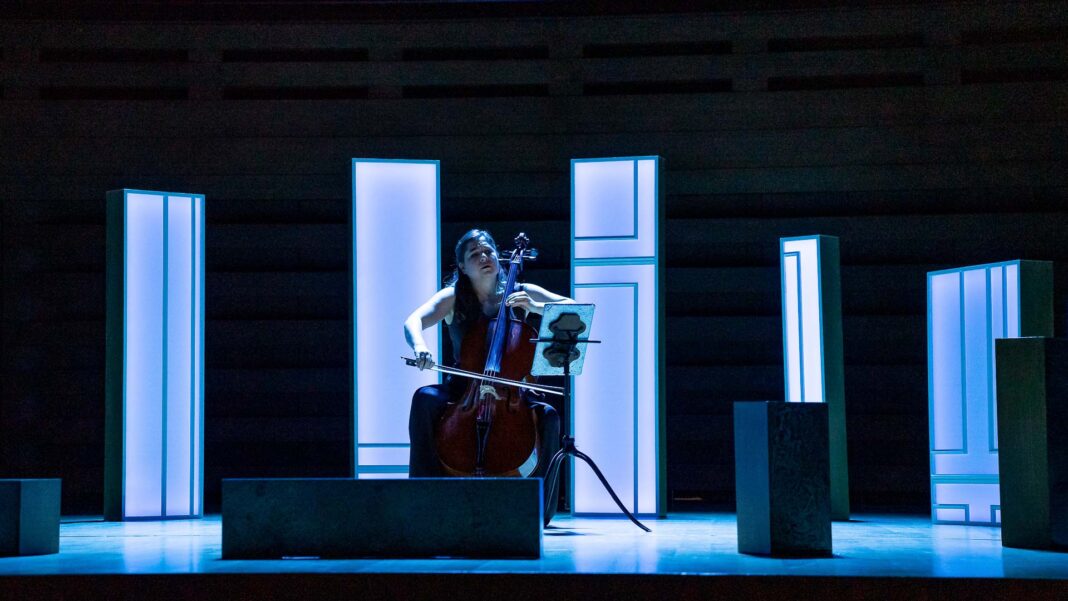In the promotional video for her new project Fragments, cellist Alisa Weilerstein immediately states, “I’m very happy to say that Fragments doesn’t really fit in any category.” How could it? Weilerstein has called on 27 different composers to write music of no more than 10 minutes that can be in one, two or three sections that she could mix and match in and around Bach’s Cello Suites.
The end result will be six different programs (one for each suite). Which of the new works by these composers are included in each performance of Fragments will only be revealed to the public after the performance. The project is directed by Elkhanah Pulitzer.

The world premiere of Fragments 1 and 2 took place in Toronto in January. Weilerstein gives the US premiere of Fragments 1 at UC Santa Barbara on Friday, March 10th. On Sunday, March 12th she will also perform Fragments 1 at Irvine Barclay Theatre. She follows that with a performance on Tuesday, March 14th at The Baker-Baum Concert Hall in La Jolla. The New York premiere will take place on April 1st at Carnegie Hall.
Weilerstein’s 2020 recording of the Bach Cello Suites received great reviews. It was also her first recording of this essential work for cellists.
But for now, she’s focused on Fragments.
I spoke with Weilerstein last week. What follows are excerpts from our conversation that have been edited for length and clarity.
The concept of Fragments allows you as an artist to keep a centuries old work old alive. By combining it with newer composers you get to introduce, perhaps, a whole new audience to both something old and something new simultaneously. Was that part of the impetus for this?
Juxtaposing the familiar with the new, for sure it was part of it. But the way in which we’re doing it is a bit different. All six of Bach’s suites are integrated into the project and 27 new pieces are integrated into the complete project. I didn’t want this to feel like a plus project. There’s actually far more new music than there is Bach – even in terms of timing. So I asked each composer to write 10 minutes of music and two or three fragments that could stand alone.
I was very upfront with every composer saying that this is not going to be used in a conventional way. These are not going to be played in order. They’re going to be interspersed with other works of music as well as the movements of the Bach. There’s not a single new piece that’s played in the order that it was written and there’s not a single Bach suite in this project that is played in its written order. There are six programs I’ve constructed to make musical sense as an entirely original work of art.
That seems a bit like a Tetris game. You had 27 composers and they each had three fragments, you’re looking at up to 81 different pieces of music that you could place anywhere you wanted. What was the process of figuring out the right match? It seems like at any different time you might have put a different set of pieces together.

There are certain rules, let’s say, to the game if we’re going to use the Tetris analogy. I knew I was going to construct six programs. The timing was very strict that each one was going to be one hour. Each one had to have a complete Bach Suite in it. Some composers wrote two fragments actually and the timing worked out just fine. Some wrote three. There are a few who wrote one and it was just a longer fragment, but it still worked out just fine.
There’s no Bach movement that’s going to be next to another Bach movement. It’s all going to be interspersed with other music – even though the complete thing will be there. These are my parameters also in constructing the programs. I did a lot of singing and juxtaposing different harmonic languages with another. Sometimes I really wanted to completely contrast the program.
I also had to take myself outside of it. What would I want as an audience member? Has it been too much kind of reflective music? Is it time now for complete shock? Is it time for something to be a continuation of something else or here’s a kind of a mirror image of something that came before it. It was really fun to play with all of that.
Did you do this from looking at scores or did you have recorded samples so that you could hear what each piece sounded like?
I had to learn the pieces first and internalize them and then I could put the programs together. I couldn’t do it without that. I needed to hear them and kind of feel them in my fingers as well.
Were these fragments meant to be inspired by the cello suites or could they be completely disassociated?
Several the composers asked me that actually. So it’s a very astute question. My answer always was the only absolute parameter are the timings. If the spirit moves you to be inspired by a Bach suite, by all means go for it. I got back a very wide variety of pieces; some were very obvious direct responses to something that they had heard. Some had absolutely zero to do with Bach at all. And everything in between.
Is there a dialog that you are creating not just with the Bach, but amongst these contemporary composers?
I think so. There are certain pieces that support others, I think, or that are continuations of what other pieces say. Sometimes I’m creating a real break and a real contrast. Like the way you would hear a like a familiar piece that has a very kind of slash and burn movement followed by something very ethereal.
I asked everybody to do the same thing and they’re all contemporary classical composers. I wasn’t interested in fusion or in any sort of crossover. I wanted to really celebrate what our art form does really well. Yet within that framework there’s so much variety. Every piece is so different. There’s not a single piece that’s remotely like another one.
That’s another reason for the no programs rule. I just wanted people to experience this music in a primal and hypnotic way. Kind of going back to what made us fall in love with music in the first place; how it how it reaches you without all this kind of context around it.
In Toronto you played Fragments One and Two. Right now those are the only two on your schedule. What is the plan to roll out the remaining Fragments?
One, two, three and four will be available next season. Then five and six will be added to that for the 24/25 [season]. So the whole thing will be out for the world to see by that point.
How has your relationship with Bach’s Cello Suites evolved over time as you’ve matured as a person and as a performer?
I’ve been playing the Bach suites for as long as I can remember. The first Bach Prelude, I could play the notes before I could really properly play the cello. As I got older I would kind of play one suite in public. But I thought this was something I was going to do when I was much, much older. I thought I was going to be 75 and have all of this, quote unquote, wisdom, which I couldn’t possibly have as a young, more middle-aged person.
I started playing them in public in the five years leading up to the recording. I also started doing the Bach marathons – the complete suites in public. I realized that I was never going to be satisfied with the way I was playing them. This was something I had to accept or just not play them at all. I was 37 when I recorded them. It was a snapshot in time. When I’m 50, I’m going to do it again. It’s going to be different and that’s a good thing.
There’s something about the power of this music that compels audiences to listen to it regularly and attend the marathons you’ve talked about. What is it about Bach’s Cello Suites?

That’s the mystery, isn’t it? It’s also one of the reasons why they are such a challenge and joy at the same time to play. There is something that is untouchable about the music in the sense that it is very hard to describe. People describe being just viscerally touched by the music. They can’t necessarily tell you why in words, but it’s just something that is so perfect intellectually and yet so naked emotionally. You don’t have to come to the Bach suites with any prior knowledge to be moved by them and that’s just really remarkable.
What’s remarkable about being on the performance side of it and being the musician who’s getting to express all of that beautiful music?
This is one of the most amazing experiences. I feel very lucky because I’ve been able to play the complete Bach suites so many times now in concert. The experience of going through that music, which take me about two and a half hours, I just feel completely wrung out intellectually, emotionally, physically by all of it. It’s deeply satisfying to go to all of those places with the suites.
You want the audience to listen and be present with their hearts, their minds and their ears when they experience Fragments. That’s the antithesis of the way we live our very distracted lives right now. What are the challenges that you see, or maybe saw in Toronto, in getting an audience instantly on board with this concept? When were you aware that true listening had taken them over?
I felt that people were there right away. I’m sure people walked in skeptical. It’s a new concept. I felt that kind of the fantastic tension when a performance is really reaching a kind of universal place. I felt that immediately. In speaking to some people who were very experienced classical listeners, they said it took them about 15 minutes to let go of the desire to want to know exactly who they were hearing. Once they consciously let go they had a totally different experience.
Talking to people who are not experienced classical music listeners, they had absolutely zero issue with this at all. Which gives me a lot of hope. The audience was quite young. Younger than usual. There was a 19-year-old guy who brought his friends with him. They’re not accustomed to classical music concerts at all, but they somehow found themselves there. They were very positive about the concert. They said the staging was super interesting and they were saying some nice things about it. And they said, “But where do they hide the microphones?” This was my favorite comment of the evening. Yes, a cello really can make all of those sounds. It was a completely sincere, well-meaning question. That made my night.
The composers who have contributed new works to FRAGMENTS are: Andy Akiho, Courtney Bryan, Chen Yi, Alan Fletcher, Gabriela Lena Frank, Osvaldo Golijov, Joseph Hallman, Gabriel Kahane, Daniel Kidane, Thomas Larcher, Tania Leon, Allison Loggins-Hull, Missy Mazzoli, Gerard McBurney, Jessie Montgomery, Reinaldo Moya, Jeffrey Mumford, Matthias Pintscher, Gity Razaz, Gili Schwarzman, Caroline Shaw, Carlos Simon, Gabriela Smith, Ana Sokolović, Joan Tower, Mathilde Wantenaar and Paul Wiancko
To see when Alisa Weilerstein and Fragments might be in your city, please go here.
Main Photo: Alisa Weilerstein in the world premiere performance of Fragments in Toronto in January 2023 (Photo by Lisa Sakulensky/Courtesy 21C Media Group)











